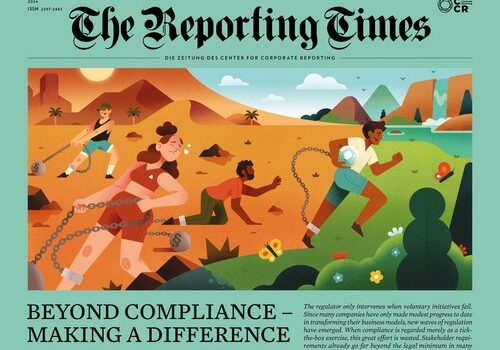Requirements to disclose non-financial performance are steadily increasing for companies and their boards of directors. For larger companies, legal requirements are becoming more stringent, while smaller companies are being weighed down by the expectations of their larger customers and financial market partners. Today, it is no longer enough to report a few key figures and initiatives from the previous year. Companies are expected to assess sustainability issues, including climate protection, in the overall context of their business activities and report on them proactively. For a board of directors to monitor whether management is responding adequately, it needs a shared understanding of the relevant sustainability issues and clearly regulated processes for responding to them. Only then can it effectively monitor the handling of sustainability risks, opportunities and reporting.
I. Legislators, business customers and financial partners are making higher demands
Corporate sustainability has rapidly evolved from a niche existence to a central business issue. Consumers, business customers and representatives from politics and civil society are increasingly making clear demands on companies regarding the implementation and transparency of sustainable corporate management.
For example, since 2017, Germany has required that certain companies publish sustainability information annually and that their board of director reviews this publication. This regulation directly affects only larger listed companies and most financial institutions. However, it also puts increasing market pressure on smaller companies that have larger business customers or work with financial institutions—essentially all companies. This requirement emerges because customers and financial market partners need information from these companies in order to fulfill their own reporting obligations.
This development is just entering the next stage of increasing responsibility and obligation and many companies are finding themselves in a double bind:
- On the one hand, the non-financial reporting requirements for companies in all sectors are currently being amended. It is expected that the content requirements will increase, and the group of affected companies will grow.
- On the other hand, far-reaching EU requirements on sustainability management and reporting by financial institutions will come into force over the next few months. These can only be implemented if financial service providers receive significantly more information on sustainability from the companies whose shares they hold in their portfolios or to which they lend.
Boards of directors of companies that need to catch up in this area should therefore promptly evaluate the extent to which the companies they monitor need to improve in this area and how these improvements can be implemented effectively. To do this, the board of directors must assess and become involved in non-financial aspects, such as the impact of climate change on the company’s activities, and engage in discussion on these matters with the company executives.
1. The requirements for non-financial reporting are increasing
In addition to product and process regulations, legislators in many industries have also regulated the publication of information on sustainability or CSR (Corporate Social Responsibility). For example, since 2017, the regulation known at EU level as the CSR Directive or Non-Financial Reporting Directive (NFRD) has been transposed into German law.1 This requires certain larger, publicly traded companies and certain financial institutions to disclose in a non-financial report information that is material to understanding the company’s position and impact on a range of environmental and social issues.
For companies directly affected by this reporting requirement, the board of directors is responsible for reviewing the non-financial report or group report. In the event of non-compliance with the reporting requirements, massive penalties and fines can be levied against the companies concerned. However, this task also gives rise to new opportunities for the board to positively influence the reporting and thus the reputation of the company.2
This non-financial reporting requirement is already undergoing an amendment, which is expected to significantly increase the requirements. In the future, many more companies could be affected and the expansion of climate-related reporting requirements is also under discussion. In addition, the central elements of the voluntary recommendations of the Task Force on Climate-Related Financial Disclosures (TCFD) may become mandatory in regulated reporting. In order to meet these requirements adequately, all companies should develop a climate strategy and integrate climate issues into their risk management.
2. Financial service providers pass sustainable finance pressure onto the real economy
A new generation of regulatory requirements requires financial companies to integrate sustainability into core functions such as governance, strategy and risk management. For example, in March 2018, the European Commission adopted an Action Plan for Sustainable Finance3 , which is rapidly being implemented legislatively. The first elements have already been adopted and will become mandatory in spring 2021, including, for example, the Transparency Regulation and the Taxonomy Regulation. While the former regulates pre-contractual transparency requirements and disclosure obligations for financial products, thus massively intervening in investment advice and lending, the latter regulates what is considered sustainable and non-sustainable economic activities.
The politically desired leverage inherent in these regulations is clear in the “European Green Deal” presented by Commission President Ursula von der Leyen in December 2019. It seeks to reduce net greenhouse gas emissions in the European Union to zero by 2050, which would make Europe the first continent to become climate neutral. These projects form the cornerstones of all EU activities in the area of sustainable financial markets. The EU has thus set itself very far-reaching sustainability goals. In fact, many consider the “European Green Deal” to be as ambitious as the reconstruction after the Second World War.
The EU’s aim here is to oblige the financial sector to act as a catalyst for the transformation of the real economy and to redirect financial flows in the direction of sustainable growth. This goal will significantly change the interfaces and cooperation between financial institutions and companies in all sectors. For example, according to the EU action plan, investors will need detailed information on how much revenue a company generates from sustainable and non-sustainable activities in order to weight shares in a portfolio. Among other things, this will mean that companies will have to communicate significantly more and different data on the concrete basis of their value creation to the financial market.
II. The days of sustainability reports on slips of paper are over
Sustainability or CSR reports are thus given a new task and are subject to new requirements. The days when sustainability reporting could be handled with a spreadsheet, a few manually compiled key figures and some random sample stories are clearly over. Companies are now required to disclose non-financial information that makes their situation transparent and enables the financial market to make meaningful risk and opportunity assessments.
1. Consider sustainability in two respects
Sustainability experts speak of “double materiality” with regard to the relevance of non-financial issues. One form of materiality describes the impact of a company’s economic activities for example on the environment (such as pollution or emissions of greenhouse gases from production or the supply chain). This aspect is much more in the public eye than the other form of materiality, which describes how issues such as climate change or resource depletion could affect the company economically (through physical risks or transition risks and opportunities from changing regulatory and market conditions). Both forms of materiality should be managed by all companies and reported to the financial market. This heralds a new era, as it involves a forward-looking assessment of the long-term viability of companies.
2. lluminate interrelationships between non-financial and financial issues
To date, voluntary initiatives have clearly shown the path that future regulation will take. First and foremost is the Task Force on Climate-Related Financial Disclosures (TCFD) framework for disclosing climate-related financial impacts. Using climate change as an example, it requires that metrics and targets are clearly reported in the context of governance, strategy and risk management to adequately reflect the relationships between non-financial and financial issues.
The TCFD is essentially a prototype of a new generation of frameworks for sustainability reporting that entail cross-functional management tasks. In this context, it is increasingly important that companies approach their activities with societal stakeholders in mind, aligning them, for example, with the 17 United Nations Sustainable Development Goals (SDGs).
That the TCFD is setting the strategic direction here is also illustrated by the recent launch of a Taskforce on Nature-related Financial Disclosure (TNFD). Other sustainability issues will not be long in coming.
3. Make good use of the time left to maneuver
Sustainability frameworks such as TCFD make a strategic approach inevitable, as their requirements no longer only concern “corporate sustainability” but reach deeply into organizational processes. Today, the TCFD and comparable frameworks are still “soft law.” However, they can be understood as pre-regulatory developments. For example, a non-binding supplement of the EU Commission to the mandatory requirements for non-financial reporting makes very extensive reference to the TCFD.4
Today, it is already apparent that boards of directors are increasingly expected to ensure that the company is solidly positioned with regard to existing and upcoming requirements. Active engagement of boards on non-financial issues is particularly important given the great speed with which these issues are being incorporated into regulation and the requirements of customers and financial partners. Our many years of consulting on sustainability have shown that companies should allow sufficient time to lay solid foundations and anchor them in their day-to-day business. The window of opportunity before regulatory and market pressures become even more pronounced should be used optimally by all market participants.
III. Conclusion
- Consideration of sustainability in management and reporting is increasingly expected from companies of all sizes and in all industries.
- The trend goes beyond simply disclosing a few key figures and initiatives. Sustainability must be understood and treated as a business issue.
- To do this, management should establish a strategic approach to sustainability that ideally includes a climate strategy.
- In order for the board of directors to effectively monitor the company in this regard, it must develop an understanding of corporate sustainability and ensure clear responsibilities for non-financial issues.
1 Act to strengthen non-financial reporting by companies in their management and group management reports (CSR Directive Implementation Act). German Federal Law Gazette Volume 2017, Part I No. 20 (April 18, 2017)
2 Kasemir/ Boecker, BOARD 2016, pp. 203-205.
3 European Commission (2018). EU action plan: Financing sustainable growth.
4 European Commission (2019). Guidelines on reporting climate-related information.
The original text entitled “Not playing to the gallery: Sustainability must be monitored by the board” by Dr. Bernd Kasemir and Dr. Ralf Frank was published in issue 6/2020 of BOARD, the journal for Supervisory Boards in Germany.
Get in touch. We are happy to tell you more about it.






